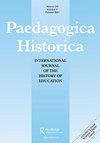“Feeling strange” ‒ oral histories of newly arrived migrant children’s experiences of schooling in Denmark from the 1970s
IF 0.3
4区 教育学
Q4 EDUCATION & EDUCATIONAL RESEARCH
引用次数: 0
Abstract
ABSTRACT Based on oral history interviews with adults with a migration history who in their childhood entered into the Danish education system as “newcomers”, the article points out that the practised identity politics of schooling in the 1970s in Denmark for migrant students was operated through affective practices of “feeling strange”. The article explores how the fact that emotions of “feeling strange” have shaped newly arrived migrants’ schooling experience in Denmark since the 1970s connects to processes of racialisation. Rather than being connected only to “feeling new” and “unexpected”, the strangeness appears as connected to the broader affective hierarchies of racialisation in a way that makes it possible for new migrant students to feel strange in a “familiar institution” such as school. The study also displays that racialised emotions of feeling strange for migrants can easily re-emerge, influencing their educational and professional paths when remembered as adults. The effects of affective racialised practice learned in the school institution thus has severe consequences for the students because their access to school is shaped through minoritised positions, something that stays with them after leaving school."感觉陌生"--20 世纪 70 年代新移民儿童在丹麦上学经历的口述历史
ABSTRACT 文章根据对童年时以 "新来者 "身份进入丹麦教育系统的有移民史的成年人进行的口述历史访谈,指出 20 世纪 70 年代丹麦学校教育对移民学生的身份政治实践是通过 "感到陌生 "的情感实践来运作的。文章探讨了自 20 世纪 70 年代以来,"感觉奇怪 "的情绪如何塑造了新移民在丹麦的学校教育经历,这一事实又如何与种族化进程相联系。这种陌生感不仅与 "新奇感 "和 "意外感 "有关,还与更广泛的种族化情感等级有关,从而使新移民学生有可能在学校这样一个 "熟悉的机构 "中感到陌生。研究还表明,移民感到陌生的种族化情绪很容易再次出现,影响他们成年后的教育和职业道路。因此,在学校机构中学到的种族化情感实践的影响对学生产生了严重后果,因为他们是通过被少数化的立场进入学校的,这种影响在他们离开学校后依然存在。
本文章由计算机程序翻译,如有差异,请以英文原文为准。
求助全文
约1分钟内获得全文
求助全文
来源期刊

PAEDAGOGICA HISTORICA
Multiple-
CiteScore
0.90
自引率
40.00%
发文量
72
期刊介绍:
"Paedagogica Historica is undoubtedly the leading journal in the field. In contrast to a series of national journals for the history of education, Paedagogica Historica is the most international one." A trilingual journal with European roots, Paedagogica Historica discusses global education issues from an historical perspective. Topics include: •Childhood and Youth •Comparative and International Education •Cultural and social policy •Curriculum •Education reform •Historiography •Schooling •Teachers •Textbooks •Theory and Methodology •The urban and rural school environment •Women and gender issues in Education
 求助内容:
求助内容: 应助结果提醒方式:
应助结果提醒方式:


